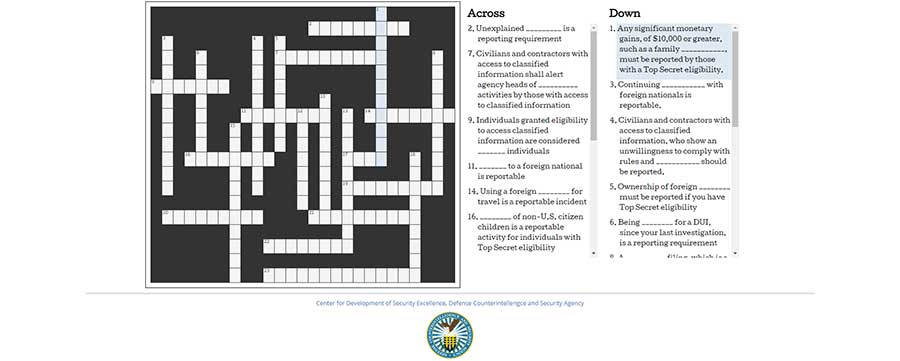
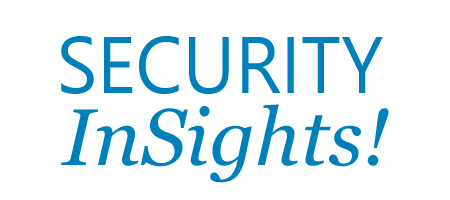


![]() Point(s) of Contact
Point(s) of Contact
Pamela Hamilton / FSO

843.327.3273
pamela@appliedsecurityknowledge.com
Richard Carmichael / ITPSO
678.221.7834
rcarmichael@laochservices.com

DoD Hotline
dodig.mil/hotline / 800.424.9098
SOURCE: CDSE to Office of the Director of National Intelligence
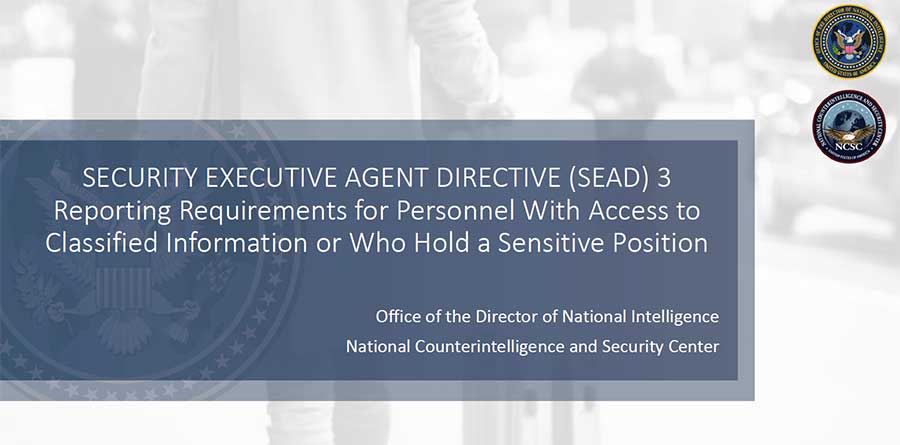
Security Executive Agent Directive 3 (SEAD3), Reporting Requirements for Personnel with Access to Classified Information or Who Hold a Sensitive Position, establishes standardized reporting requirements across the federal government for all "covered" individuals with access to classified information or who hold a sensitive position.
SEAD 3 was designed to strengthen the safeguarding of national security equities, such as national security information, personnel, facilities, and technologies. Reporting Requirements At A Glance (SEAD 3 Sensitive positions are any positions within or in support of an agency in which the employee could potentially cause a material "adverse" effect on national security regardless of whether the occupant has access to classified information and regardless of whether the occupant is a civilian employee, military service member, or contractor based on the nature of the position.
The designation levels of Noncritical-sensitive, Critical-sensitive, and Special-sensitive determine the degree to which any person in the position could cause a "material adverse" effect on national security.
Contractors are informed whether their position is sensitive for the performance of their duties by their Facility Security Officer, also known as FSO.
All individuals with eligibility for access to classified information or who hold a sensitive position have a continuing obligation and responsibility to recognize, avoid, and report personal behaviors which may adversely impact their continued national security eligibility. Any involvement should be reported to their security official or designees.
Individuals obligated by the policy to report these incidents are under an ongoing assessment to determine whether they are an acceptable risk to national security. Individuals who do not report these incidents to the appropriate official, or who fail to comply with reporting requirements outlined in SEAD 3, may undergo administrative action that includes, but is not limited to, revocation of their national security eligibility.
Criminals and hostile actors may act anonymously or dishonestly online in an attempt to connect with people who have access to valuable and sensitive information. They often do this by posing as recruiters or talent agents who approach individuals with enticing opportunities, when their real intent is to gather as much information as possible from the target. The consequences of engaging with these profiles can damage individual careers, as well as the interests of your organization and the interests of UK national security and prosperity. This guidance provides practical advice on how to identify them, respond, and minimize the risk of being targeted in the first instance.
SOURCE: Clearance Jobs by Lindy Kyzer – April 15, 2021
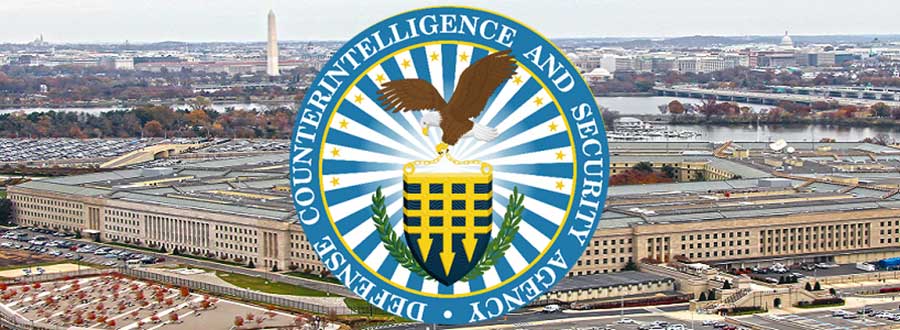
The implementation of Continuous Vetting (CV) is ramping up through FY 2021, with the Defense Counterintelligence and Security Agency noting that all security clearance holders will be under its CV/Continuous Evaluation program by year's end. Officials with DCSA and the Office of the Director of National Intelligence (ODNI) provided updates on Trusted Workforce 2.0 at yesterday's National Industrial Security Program Policy Advisory Committee meeting. CV enrollment remains the key piece of Trusted Workforce 1.25 and 1.5 as both the DoD and Intelligence Community work to both enroll current clearance holders and new applicants and refine their vetting procedures.
DCSA said they are enrolling all new applicants post-adjudication and have 675,000 industry applicants currently enrolled, with approximately 350,000 industry subjects pending enrollment, according to Marrianna Martineau, assistant director for adjudications at DCSA.
CONTINUOUS EVALUATION IS WORKING – BUT SO SHOULD SELF-REPORTING
The push forward for CV is made possible by IT advancements within DCSA, and the need for speed is fueled by the program's current success. Martineau noted that 48% of CV alerts were for issues that weren't previously known, with criminal and financial issues being the most likely to trigger an alert.
SOURCE: army.mil by Patrick Buffett – February 4, 2021

"Regardless of its widespread availability, it's a federally prohibited substance and, therefore, illegal within the DOD workforce," stated Katina Oates, the Army Substance Abuse Program manager here.
Her remark is in reference to products containing cannabidiol extract, or CBD, which have exploded in popularity as a result of aggressive civilian advertising that touts their benefits as pain relievers, stress reducers, depression inhibitors and more.
"CBD is everywhere," a recently released Army News article pointed out. "You would be hard-pressed to enter any pharmacy, mega-mart or health food store and not find it on the shelves. CBD can even be purchased online from the comfort of your couch."
SOURCE: Clearance Jobs by Lindy Kyzer – April 14, 2021
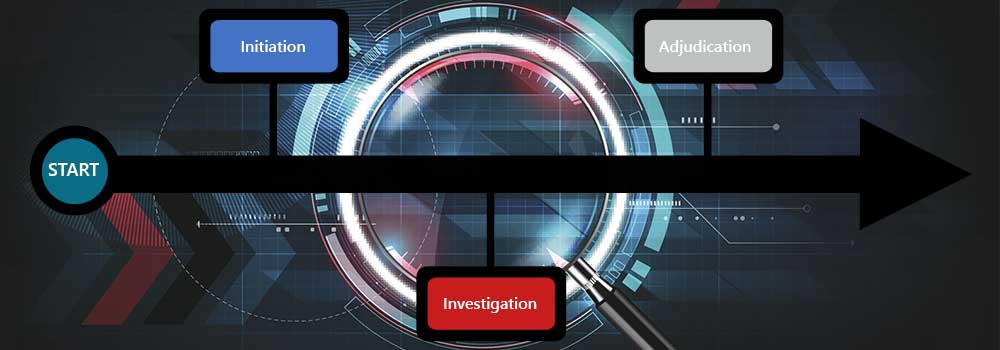
Department of Defense Industry security clearance processing times saw a slight up-tick in the second quarter of FY 2021, according to updates given by the Defense Counterintelligence and Security Agency at today's National Industrial Security Program Policy Advisory Committee (NISPPAC) meeting. Current Top Secret clearance processing times are 159 days, and Secret clearance processing times are 132 days. These numbers only represent industry applicants – processing times are slightly faster for all DCSA cases, which included DoD civilians and service members.
Government officials noted that missions were moving forward despite COVID-19. Professionals at the Office of the Director of National Intelligence (ODNI) and DCSA continue to work either remotely or in staggered shifts, and background investigators were largely promote pre-pandemic. Up ticks in security clearance processing times have occurred, due to increases in seasonal employment, and COVID-19 related delays. Just because background investigators remain at work doesn't mean the individuals they need to gather information from are, and that impacts security clearance processing times.
SOURCE: CDSE
